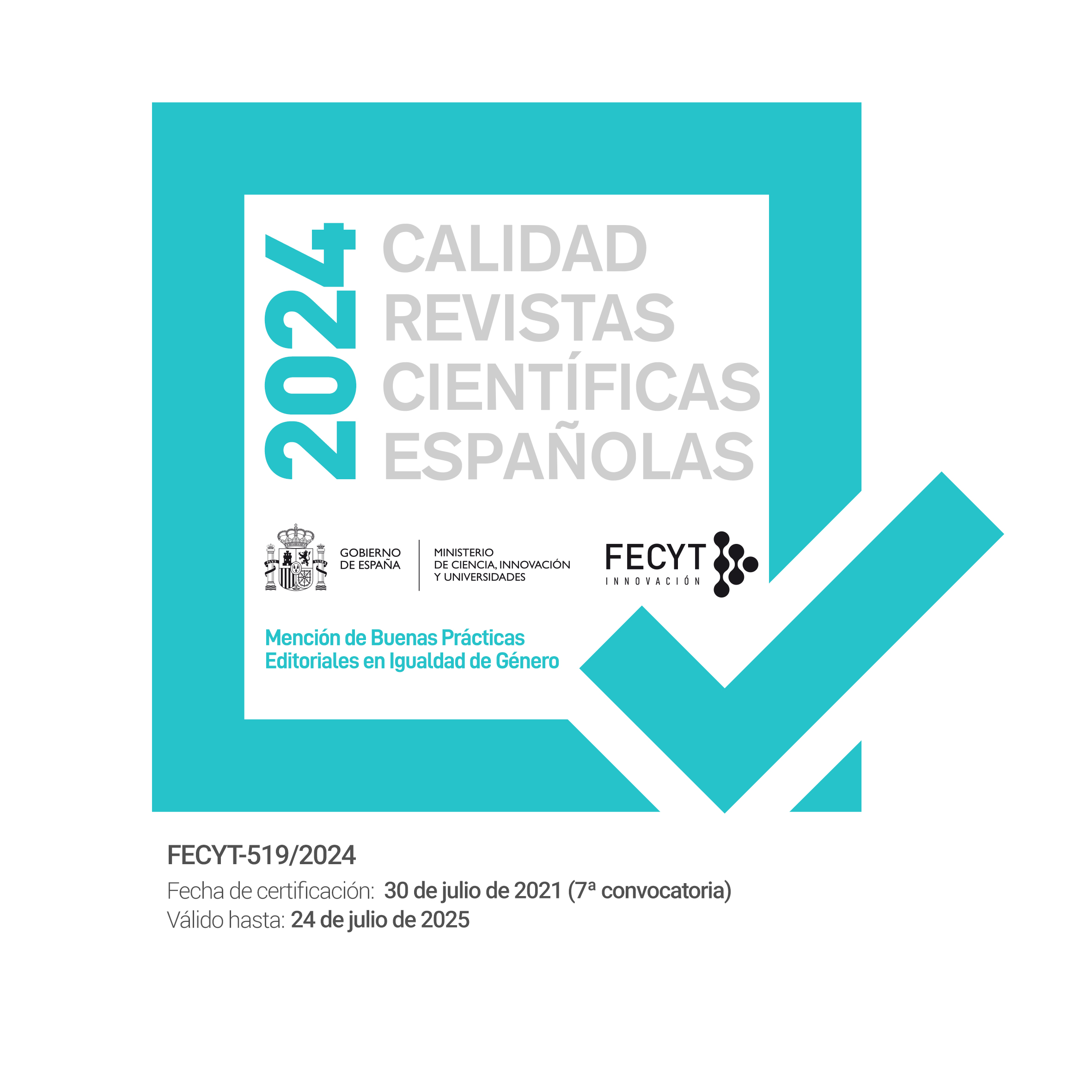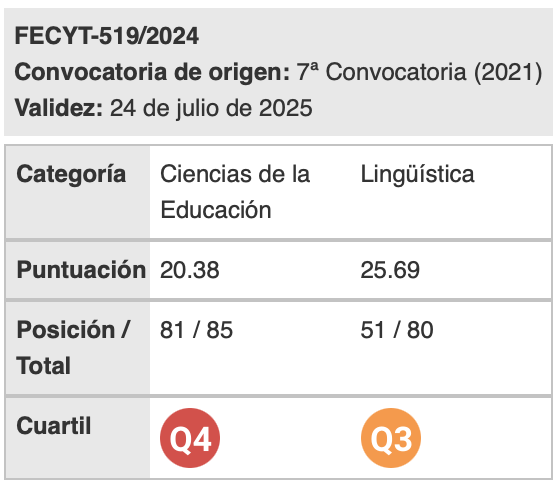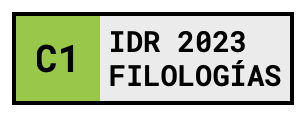Proyecto de investigación PluriTAV. Estudio cuasiexperimental de la aplicación de una secuencia didáctica centrada en el desarrollo de la competencia plurilingüe y pluricultural
Palabras clave:
traducción audiovisual, enseñanza de lenguas extranjeras, competencia plurilingüe y pluricultural, estudio experimental, inglés para fines específicosResumen
El potencial de la traducción audiovisual (TAV) en la didáctica de la lengua extranjera (LE) ha sido demostrado por diversos autores (Lertola, 2019) y proyectos, como LeViS (Sokoli, 2006) o ClipFlair (Baños y Sokoli, 2015). Sin embargo, su utilidad en el desarrollo de la competencia plurilingüe y pluricultural (CPP) aún está relativamente inexplorada (Baños et al., 2021). Esta competencia —recogida en el Marco Común Europeo de Referencia para las Lenguas (MCER) y el Marco de Referencia para los Enfoques Plurales de las Lenguas y de las Culturas (MAREP)— aboga por alejarse del uso exclusivo de la LE y apuesta por los enfoques plurales en el aula. En este escenario surgió PluriTAV (La traducción audiovisual como herramienta para el desarrollo de competencias plurilingües en el aula, 2016-2019), un proyecto de investigación cuyo objetivo fue trabajar el enfoque multilingüe mediante la TAV en tres ámbitos: el perfeccionamiento de las competencias en la LE y las lenguas maternas, y el desarrollo de la CPP.
Este artículo presenta las bases teóricas de PluriTAV, así como el diseño y los resultados de la implementación empírica de una secuencia didáctica (SD) centrada en la modalidad de doblaje interlingüístico. Esta SD incluye ejemplos de actividades que exploran el impacto de la transferencia intra e interlingüística en el desarrollo de la CPP por parte de estudiantes universitarios de inglés para fines específicos con un nivel de inglés B2. El artículo concluye con unas reflexiones sobre los resultados del diseño e implementación de la SD, sobre las posibilidades de adaptarla a otros contextos y niveles educativos, y sobre el potencial de la TAV en la adquisición de la CPP en la educación superior.
Descargas
Citas
Baños, R., Marzà, A. y Torralba, G. (2021). Promoting plurilingual and pluricultural competence in language learning through audiovisual translation. Translation and Translanguaging in Multilingual Contexts, 7(1), 65-85.
Baños, R. y Sokoli, S. (2015). Learning foreign languages with ClipFlair: Using captioning and revoicing activities to increase students’ motivation and engagement. En K. Borthwick, E. Corradini y A. Dickens (Eds.), 10 years of the LLAS elearning symposium: case studies in good practice (pp. 203-213). Dublín: Research-publishing.net.
Beacco, J. C., Byram, M., Cavalli, M., Coste, D., Cuenat, M. E., Goullier, F., y Panthier, J. (2016). Guide for the development and implementation of curricula for plurilingual and intercultural education. Estrasburgo: Consejo de Europa.
Borghetti, C. y Lertola, J. (2014). Interlingual subtitling for intercultural language education: a case study. Language and Intercultural Communication, 14(4), 423-440.
Bronckart, J.P. (1999). L’enseignement des langues; pour une construction des capacités textuelles. En M. García, R. Giner, P. Ribera y C. Rodríguez (Eds.), Ensenyament de Llengües i Plurilingüisme (pp. 17-26). Valencia: Universitat de València.
Calduch, C. y Talaván, N. (2017). Traducción audiovisual y aprendizaje del español como L2: el uso de la audiodescripción. Journal of Spanish Language Teaching, 4(2), 168-180.
Candelier, M., Camilleri-Grima, A., Castellotti, V., de Pietro, J.-F., Lörincz, I., Meissner, F.-J., Noguerol, A., y Schröder-Sura, A. (2013). Marco de Referencia para los Enfoques Plurales de las Lenguas y de las Culturas. Competencias y recursos. Graz: European Centre for Modern Languages.
Cenoz, J. y Gorter, D. (2014). Focus on Multilingualism as an Approach in Educational Contexts. En A. Blackledge y A. Creese (Eds.), Heteroglossia as Practice and Pedagogy (pp. 239-254). Dordrecht: Springer.
Chaume, F. (2012). Audiovisual Translation: Dubbing. Mánchester: St. Jerome.
Consejo de Europa. (2002). Marco común europeo de referencia para las lenguas: aprendizaje, enseñanza y evaluación (Trad. Instituto Cervantes). Madrid: Instituto Cervantes. (Original de 2001).
Consejo de Europa. (2018). Common European Framework of Reference for Languages: Learning, Teaching, Assessment. Companion Volume with New Descriptors. Estrasburgo: Consejo de Europa.
Coste, D., Moore, D. y Zarate, G. ([1997] 2009). Compétence plurilingue et pluriculturelle, Vers un Cadre Européen Commun de référence pour l’enseignement et l’apprentissage des langues vivantes. Estrasburgo: Consejo de Europa.
Cummins, J. (1979). Linguistic Interdependence and the Educational Development of Bilingual Children. Review of Educational Research, 49(2): 222-251.
Dolz, J., Noverraz, M. y Schneuwly, B. (2001). Séquences didactiques pour l’oral et pour l’écrit. Bruselas: Éditions de Boeck.
Ibáñez Moreno, A. y Vermeulen, A. (2013). Audio description as a tool to improve lexical and phraseological competence in foreign language learning. En D. Tsagari y G. Floros (Eds.), Translation in language teaching and assessment (pp. 45-61). Newcastle upon Tyne: Cambridge Scholars Publishing.
Ibáñez, A., Jordano de la Torre, M. y Vermeulen, A. (2016). Visp Design and Evaluation, a Mobile Application To Practise Oral Competence. RIED. Revista Iberoamericana de Educación a Distancia, 19(1), 63-81.
Incalcaterra, L. y Lertola, J. (2011). Subtitling Activities for Foreign Language Learning: What Learners and Teachers Think. En L. Incalcaterra, M. Biscio y M. A. Ní Mhainnín (Coords.), Audiovisual Translation Subtitles and Subtitling (pp. 243-263). Oxford: Peter Lang.
Jakobson, R. (1959). On Linguistic Aspects of Translation. En A. Reuben (Ed.), On Translation (pp. 232–239). Cambridge, MA: Harvard University Press.
Kress, G. y Van Leeuwen, T. (2001). Multimodal discourse: The modes and media of contemporary communication. Londres: Arnold Publishers
Larsen-Freeman, D. y Anderson, M. (2011). Techniques and Principles in Language Teaching (3a ed.). Oxford: Oxford University Press.
Lenz, P., y Berthele, R. (2010). Assessment in plurilingual and intercultural education. Ginebra: Consejo de Europa.
Lertola, J. (2012). The effect of the subtitling task on vocabulary learning. En A. Pym y D. Orrego-Carmona (Eds.), Translation Research Projects 4 (pp. 61-70). Tarragona: Universitat Rovira i Virgili.
Lertola, J. (2019). Audiovisual Translation in the Foreign Language Classroom: Applications in the Teaching of English and Other Foreign Languages. Research-publishing.net.
Lertola, J. y Mariotti, C. (2017). Reverse Dubbing and Subtitling: Raising Pragmatic Awareness in Italian English as a Second Language (ESL) Learners. JoSTrans: The Journal of Specialised Translation, 28, 214-216.
Marzà, A., Torralba, G. y Baños, R. (2021). Assessing Plurilingual Competence: the Challenge of Designing Suitable Tests and Rubrics. En J. J. Martínez Sierra (Ed.) Multilingualism, Translation and Language Teaching: The PluriTAV Project (pp. 113-165). Valencia: Tirant lo Blanch.
Marzà, A., Torralba, G., Cerezo, B., y Martínez Sierra, J. J. (2018). PluriTAV: desarrollo de las competencias plurilingües mediante el uso de la traducción audiovisual. En V. Vega Carrero y E. Vendrell Vidal (Eds.), IN-RED 2018: IV Congreso Nacional de Innovación Educativa y Docencia en Red (pp. 111-125). Valencia: Universitat Politècnica de València.
Martínez Sierra, J.J. (Ed.). (2020). Multilingualism, Translation and Language Teaching. The PluriTAV Project. Valencia: Tirant Humanidades.
Muccino, G. (Director). (2006). The Pursuit of Happyness [Película]. Columbia Pictures.
Muñoz-Miquel, A. y Soler Pardo, B. (2021). Language Learning and Audiovisual Translation: Designing and using Language Tests. En J. J. Martínez Sierra (Ed.) Multilingualism, Translation and Language Teaching: The PluriTAV Project (pp. 77-112). Valencia: Tirant lo Blanch.
Navarrete, M. (2018). The use of audio description in foreign language education. A preliminary approach. Translation and Translanguaging in Multilingual Contexts. Audiovisual translation in applied linguistics: Educational perspectives, 4(1), 129-149.
Richards, J. C. y Rodgers, T. S. (2003). Enfoques y métodos en la enseñanza de idiomas (2ª ed.). (Trad. J. M. Castrillo). Madrid: Edinumen. (Original de 2001).
Sánchez-Requena, A. (2016). Audiovisual translation in teaching foreign languages: Contributions of dubbing to develop fluency and pronunciation in spontaneous conversations. Porta Linguarum, 6, 9-21.
Sánchez-Requena, A. (2018). Intralingual dubbing as a tool for developing speaking skills. Translation and Translanguaging in Multilingual Contexts. Audiovisual translation in applied linguistics: Educational perspectives, 4(1), 101-128.
Sokoli, S. (2006). Learning via subtitling (LvS). A tool for the creation of foreign language learning activities based on film subtitling. En M. Carroll, H. Gerzymisch-Arbogast y S. Nauert (Eds.), MuTra 2006-Audiovisual Translation Scenarios: Conference Proceedings (pp. 1-8). Copenhague: MuTra.
Sokoli, S. (2015). Clipflair: Foreign language learning through interactive revoicing and captioning of clips. En Y. Gambier, A. Caimi y C. Mariotti (Eds.), Subtitles and Language Learning: Principles, Strategies and Practical Experiences (pp. 127-148). Berna: Peter Lang.
Stathopoulou, M. (2015). Cross-language mediation in foreign language teaching and testing. Bristol: Multilingual Matters.
Talaván, N. (2013). La subtitulación en el aprendizaje de lenguas extranjeras. Barcelona: Octaedro.
Talaván, N. (2019). Using subtitles for the deaf and hard of hearing as an innovative pedagogical tool in the language class. International Journal of English Studies, 18(2), 161-186.
Talaván, N. y Ávila-Cabrera, J.J. (2015). First Insights into the combination of dubbing and subtitling as L2 didactic tools. En A. Caimi y C. Mariotti (Eds.), Subtitles and Language Learning (pp. 149-172). Oxford: Peter Lang.
Talaván, N. y Costal, T. (2017). iDub-The potential of intralingual dubbing in foreign language learning: How to assess the task. Language Value, 9(1), 62-88.
Descargas
Publicado
Cómo citar
Número
Sección
Licencia
Aquellos autores/as que tengan publicaciones con esta revista, aceptan los términos siguientes:
- Los autores/as conservarán sus derechos de autor y garantizarán a la revista el derecho de primera publicación de su obra, el cuál estará simultáneamente sujeto a la Licencia de reconocimiento de Creative Commons que permite a terceros compartir la obra siempre que se indique su autor y su primera publicación esta revista.
- Los autores/as podrán adoptar otros acuerdos de licencia no exclusiva de distribución de la versión de la obra publicada (p. ej.: depositarla en un archivo telemático institucional o publicarla en un volumen monográfico) siempre que se indique la publicación inicial en esta revista.
- Se permite y recomienda a los autores/as difundir su obra a través de Internet (p. ej.: en archivos telemáticos institucionales o en su página web) antes y durante el proceso de envío, lo cual puede producir intercambios interesantes y aumentar las citas de la obra publicada. (Véase El efecto del acceso abierto).

Revista de Lenguas para fines específicos is licensed under a Creative Commons Reconocimiento-NoComercial-SinObraDerivada 4.0 Internacional License.























